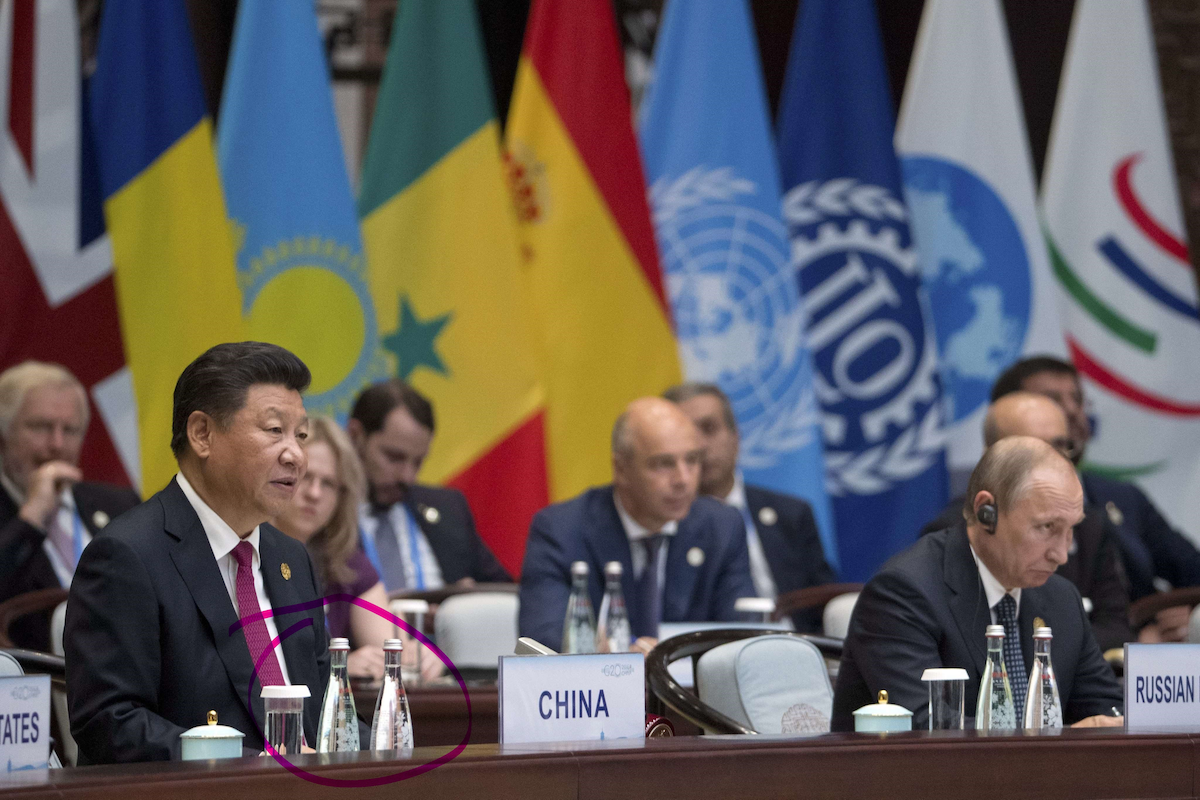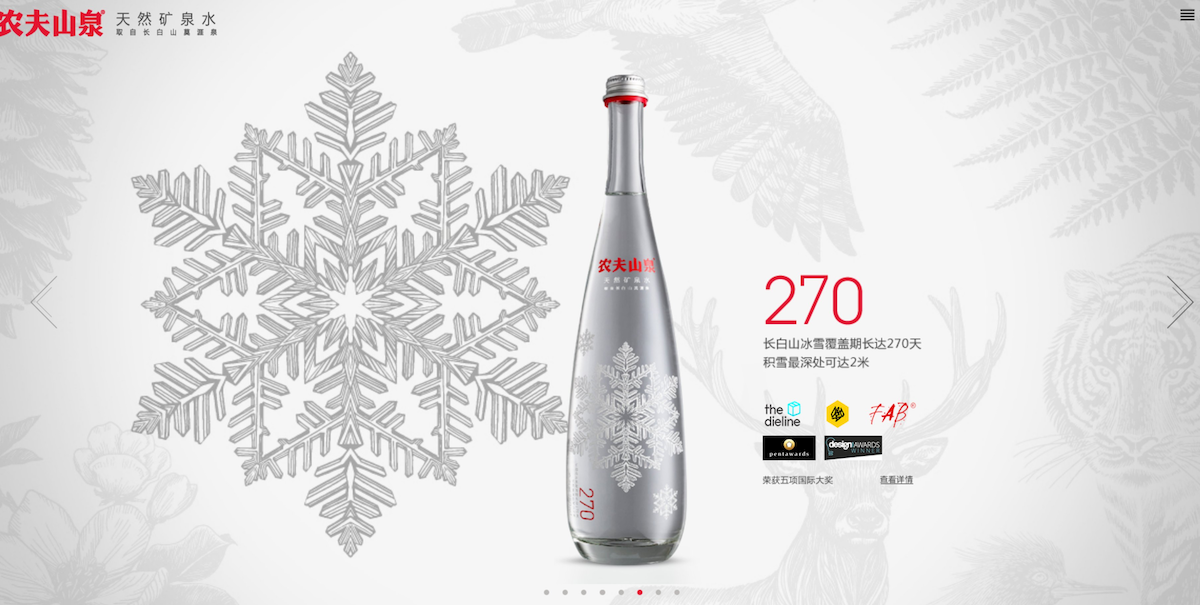In recent weeks, both the Nobel prize-winning novelist Mo Yan and the Chinese bottled water company Nongfu Spring have come under fire from extreme Chinese nationalists, who have accused them of being insufficiently patriotic. In Mo Yan’s case, the controversy was touched off when a nationalist blogger filed a court order to stop the acclaimed novelist from supposedly defaming China’s heroes and martyrs. Nongfu Spring’s headaches began with rumors of a business rivalry with Wahaha Group (another Chinese bottled water company), spiraled into accusations that the company was too pro-Japanese, and culminated in an announced boycott of Nongfu Spring products by a number of 7-Eleven stores in China. (Interestingly, 7-Eleven is headquartered in Texas and owned by Japanese company Seven & I Holdings.)
Writing for China Media Project, Alex Colville described how the accusations against Mo Yan blew up online due to a combination of harsher, more nationalistic laws and an increasingly aggressive, xenophobic online culture:
One of China’s most celebrated modern authors is in the firing line, and the ammunition is a hardline 2018 law on the protection of heroes and martyrs. The Nobel Prize-winning writer Mo Yan (莫言) has irked extreme nationalist bloggers on the internet, one of whom, writing under the account name “Mao Xinghuo Who Speaks the Truth” (说真话的毛星火), filed a court order late last month to remove Mo Yan’s books from circulation and force him to pay 1.5 billion RMB in damages to the Chinese people and “stop infringing on heroes and martyrs” in his fiction.
The blogger’s four-page indictment, submitted to the Beijing Procuratorate, meticulously lists Mo Yan’s supposed offenses, including portraying members of the Eighth Route Army during the Second Sino-Japanese War as sexually abusive, “beautifying” Japanese soldiers, insulting Mao Zedong, and saying that the Chinese people have “no truth and no common sense.”
“Such words and deeds have greatly hurt the feelings of the Chinese people,” Mao Xinghuo solemnly claims. “As an upright and patriotic young man, I feel very angry. How does the country allow such behavior to exist?” The blogger has been trying to bring a case against Mo Yan for months, and has asked publishers not to work with him. Fellow nationalist bloggers rallied to the cause, pointing to the more sexually explicit parts of his oeuvre as pornographic. [Source]
The backlash to the lawsuit was swift, with a number of journalists, commentators, and bloggers rushing to Mo Yan’s defense. Even some Chinese state media outlets and former Global Times editor Hu Xijin weighed in on Mo Yan’s side.
Sharp-tongued media commentator and former editor of Global Times Hu Xijin also criticized Wu, calling his attempt to sue Mo a “farce” and a “populist” act. On Weibo, Hu decried support for the action as “a very alarming trend in online public opinion.”
In return, Wu threatened to sue Hu too.
Online, discussion was divided: Some called it a reflection of growing nationalism in China and others condemned the accusers. The controversy has trended on Weibo, where the hashtag #MoYanbeingsued had been viewed around 2 million times. At least one other related hashtag has been censored.
Murong Xuecun, a well-known Chinese writer who lives in exile in Australia, said he sees no evidence the government is backing the targeting of Mo, but it has created an environment where such patriotic attacks are encouraged.
“This trend has incited people to report, to inform on and to expose each other, targeting those who diverge from mainstream ideologies or promote universal values,” he said. “That’s what authorities have been doing.” [Source]
While this is not the first time that Mo Yan has been at the center of controversy, it is unusual in that he has become a target of Chinese nationalists—criticized for not being patriotic enough, as opposed to being too close to the CCP and the Party-state. Back in 2012, when Mo Yan was awarded the Nobel Prize for Literature, he came under fire for defending Chinese government censorship as a necessary evil, likening it to an airport security check, and for refusing to discuss the imprisonment of Nobel Peace Prize laureate Liu Xiaobo. The quality of his writing also came under scrutiny, with some detractors characterizing it as “banal.” Mo Yan was the second Chinese author to be awarded the Nobel Prize for Literature: in 2000, when Chinese émigré and (later) naturalized French citizen Gao Xingjian won, many of his detractors complained that he wasn’t “Chinese enough.”
Just as this latest Mo Yan controversy was making headlines, Nongfu Spring found itself “besieged on all sides” by nationalist trolls making all manner of unsubstantiated claims about the company’s lack of patriotism, supposedly Japanese-inspired label designs, and even the citizenship status and loyalties of relatives of Nongfu Spring executives.
SCMP’s Mandy Zou reported on the online furor and viral videos that sparked the boycott of Nongfu Spring’s products:
Angry consumers and retailers initiated a boycott of Nongfu Spring’s products after rumours spread the company was using pictures of Japanese religious buildings on its packaging, though the bottler said last week the designs are artistic creations based on a Chinese temple.
The controversy reached a fever pitch as online content creators began to post videos of themselves pouring Nongfu Spring water into toilets, and two 7-Eleven convenience stores in Jiangsu province pledged in a statement last Friday not to sell any of the company’s products, calling it a business that “reveres Japan”.
[…] Noting that Wahaha and Nongfu Spring, both based in the private business hub of Zhejiang, are outstanding domestic firms that deserve praise rather than attacks, [Zhou Dewen, head of an association representing small and medium-sized enterprises in Wenzhou, Zhejiang province] said, “Nongfu Spring makes great contributions to the Chinese economy and society – just imagine how much tax it has paid.”
[…] Wu Fang, a professor at Shanghai University of Finance and Economics’ business college, said when “nationalism prevails” entrepreneurs need to keep a low profile.
“They need to avoid the spotlight, because issues such as their nationality and personal beliefs are likely to be exaggerated in such an era.” [Source]
Writing for Semafor, Diego Mendoza summarized some coverage of the Nongfu Spring controversy and the subsequent boycott that tanked the company’s Hong Kong share prices:
China’s largest bottled water company, Nongfu Spring, has become the latest firm to be targeted by a social media boycott — over its ultra-wealthy founder — with Chinese officials worried that nationalist consumers could hinder the already shaky growth of the country’s private sector.
The pushback began in February after the death of Zong Qinghou, the founder of rival Wahaha bottled water, prompted social media users to hail Zong as a Chinese patriot. This prompted unflattering comparisons with Nongfu Spring leader Zhong Shanshan, currently China’s richest man.
Social media users called Zhong an “ungrateful profit-oriented businessman,” alleging a lack of patriotism because his son holds a U.S. passport – which some nationalists perceive as showing a lack of loyalty to China. They also claimed that Nongfu was using Japanese imagery in its branding, an inflammatory accusation in a country where anti-Japanese sentiment runs deep.
The repercussions have been substantial: stores across China said they would stop selling Nongfu products, and steep dips in the company’s Hong Kong shares wiped about 30 billion yuan ($4 billion) off its market capitalization, according to Nikkei Asia.
China’s government has been keen to promote nationalist economics — rewarding businesses that embody national pride and patriotism. However, several violent incidents over the last few years targeting companies seen as unpatriotic have led Beijing to step in, seeking to prioritize societal stability over the inflaming of nationalist grudges. [Source]
Nikkei Asia’s Cissy Zhou delved into some of the outrageous claims being made against Nongfu Spring, and described how whipping up anti-foreign sentiment has turned into a profitable business for some online Chinese nationalists:
Critics are also taking aim at other aspects of Nongfu Spring, including the fact that [company founder Zhong Shanshan’s] son, Zhong Shu Zi, is a U.S. passport holder, something that was disclosed in the company’s 2020 prospectus.
The criticism did not stop there, as users accused Nongfu Spring of using a picture of a Japanese temple on its bottled tea labels. Some even connected a Greek character on one of its jasmine tea bottles to the shape of the entrance gate of the controversial Yasukuni Shrine. The shrine commemorates Japan’s war dead as well as some class-A war criminals and is regarded by China and South Korea as a symbol of Japan’s past military aggression.
Others said the red, round bottle cap of Nongfu Spring bottled water represents the Japanese flag — if held up against a piece of white paper.
[…] Luwei Rose Luqiu, an associate professor at Hong Kong Baptist University, said such online flare-ups are not uncommon. “Nationalism is a profitable business in China. Interference with personal lives and business activities by accusing individuals of being pro-Japan is prevalent in China, and this shows there is a general fondness for such content on Chinese social media, which is in line with the official propaganda lines.” [Source]
A WeChat post by blogger Liu Sandao, archived by CDT Chinese editors, notes that Mo Yan’s accuser Wu Wanzheng (whose online name is Mao Xinghuo) seems to have profited from his nationalism, as well. Taking advantage of his new higher profile, Mao Xinghuo promptly launched a paid subscription service at 50 yuan per month, with an annual subscription priced at 500 yuan.
CDT Chinese editors have archived a large number of essays and articles about the attacks on both Mo Yan and Nongfu Spring. One recent CDT Chinese post notes that as of March 11, Weibo had blocked the hashtag #7-Eleven Convenience Stores Stop Selling Nongfu Spring Products” (#711便利店停售农夫山泉旗下产品). Despite the online censorship, our editors were able to collect some comments from Chinese internet users about the Nongfu Spring boycott. A selection of these are translated below:
nateoo0: A Japanese company that’s patriotic to China, gotta love it.
ElfSS4: It’s schizophrenic.
做教培的煮老师: Idiocy and anti-intellectualism are rampant. That not-so-bygone era is making a comeback.
七片清叶: Really, this is funnier than “Funniest Soviet Jokes: The Complete Works.”
楚怀王爱吃馕包肉: It’s easier to kindle a populist fire than to extinguish it when it starts burning out of control.
挂羊头不卖狗肉卖驴肉: Now even your drinking water can reveal your politics and ideology, hahaha.
who与争锋: This is a case of “the upper strata scheming while the lower strata prey on each other.” People on the bottom are destroying one another’s property, while those at the top take advantage of populism and pander to the craziness, acting like those “Six Okamoto Gentlemen” by opening a Japanese convenience store franchise and then pretending to be anti-Japanese.
EricLiu_USA: How dare you drink Nongfu Spring, which costs 50 yuan a bottle!
A photo of Xi Jinping with two bottles of high-end Nongfu Spring Water in front of him.
An advertisement for the high-end version of Nongfu Spring Water. [Chinese]









